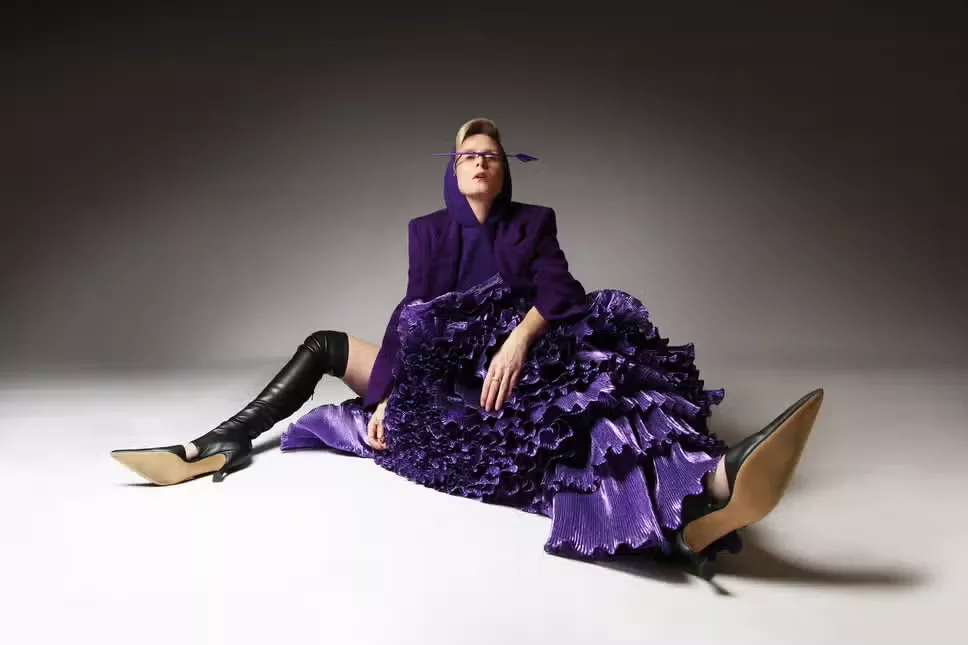In a bizarre twist of fate, Róisín Murphy finds herself embodying the persona of Jason, a worn-out raver with an insatiable thirst for the nostalgia of yesteryear. This peculiar spectacle is a regular occurrence on her TikTok account, where she introduces us to her fictional manager Karol and regales us with tales of the glory days of dance music.
While she indulges in satire, Murphy admits, “I definitely have some Jason in me.” With a cockney accent, she shares, “The Nineties was bloody exceptional, and these kids these days, they know nothing. But I do!” Almost as quickly as the accent appeared, it dissolves back into Murphy’s distinct Irish lilt. “I had a blast in the Nineties, for heaven’s sake!”
Despite having left an indelible mark on contemporary pop with her distinct vocal-led, nu-disco sound, which has undoubtedly influenced artists such as Dua Lipa, Kylie, and Jessie Ware, Murphy argues that the genre has become “eerily similar”. She acknowledges that the present era is an “absolutely remarkable time for music” but fails to find solace in the current state of pop. “It’s like ordering takeaway – different appearances but ultimately the same flavor,” she laments.
Murphy’s critique of modern pop music as monotonous and homogenous is not without merit. Over the years, the industry has witnessed a proliferation of generic and formulaic tracks that bear an undeniable resemblance to the popular hits of the past. The distinctiveness and diversity that once characterized the genre have been replaced by a conveyor belt of mindless tunes. Perhaps it is time for pop music to reclaim its pioneering spirit and push the boundaries.
One cannot deny that the influence of Róisín Murphy’s unique sound can be heard in the latest works of prominent pop artists. Dua Lipa, with her infectious dance-pop tracks, has undeniably drawn inspiration from Murphy’s style. Similarly, Kylie’s recent release, which is steeped in disco influences, can be traced back to the infectious beats and sensual vocals that define Murphy’s music. Even Jessie Ware’s soulful electro-pop sound bears traces of Murphy’s influence. These artists, while talented in their own right, owe a debt of gratitude to Murphy for paving the way for their success.
Yet, despite the apparent impact she has had on the pop landscape, Murphy finds herself disenchanted by the lack of originality and diversity in the genre. It is disheartening to witness the sameness that permeates contemporary pop music, where artists seem content to take the easy route, replicating tried and tested formulas in an effort to achieve commercial success. The absence of risk-taking and experimentation has left a void, depriving listeners of the excitement and surprise that comes from innovative creations.
Murphy, a true pioneer herself, has always charted her own path. Her distinct voice, coupled with her genre-bending sound, set her apart from her contemporaries. She fearlessly blended disco, electronic, and pop elements to create a mesmerizing sonic experience that captivated audiences worldwide. It is this fearless approach to music that she seeks in the modern pop landscape, an ethos that allows for exploration and growth rather than stagnation and repetition.
While Murphy acknowledges that the present age is filled with remarkable talent and groundbreaking music, she laments the lack of distinction within the pop genre. She compares it to ordering a takeaway meal – different dishes, textures, and appearances, but ultimately, they all taste the same. This analogy perfectly encapsulates the monotonous cycle that pop music finds itself trapped in. It is time for artists to break free from this stagnant loop and offer their listeners something fresh and original.
The need for change is not limited to the artists alone. Listeners, too, have a role to play in demanding diversity and innovation within the pop music landscape. By supporting artists who take risks and explore new territories, we can create a demand for music that challenges the status quo. It is through this collective effort that we can breathe new life into the genre and restore its vibrancy.
Róisín Murphy’s tenure in the Nineties has undoubtedly shaped her perspective on the current state of pop music. It was an era bursting with creativity and boundary-pushing sounds, which she fondly recalls as “fackin’ special”. The energy and excitement of that period created a fertile ground for experimentation, allowing artists to forge their own paths and leave an indelible mark on the industry.
In contrast, the present is defined by conformity and replication. Pop artists seem content to tread already well-worn paths, opting for safe and predictable formulas rather than taking risks. This formulaic approach has resulted in a homogenous sound that fails to inspire or challenge its listeners. It is in this sea of sameness that Murphy finds herself swimming aga
inst the tide, yearning for a return to the days of innovation and originality.
As we analyze Róisín Murphy’s critique of modern pop music, it is crucial to acknowledge her contributions to the genre. Her influence on contemporary pop is undeniable, and her unique sound continues to reverberate through the works of current pop artists. Therefore, her calls for change are not those of an outsider looking in but rather that of an experienced artist who understands what the genre is capable of and, more importantly, what it currently lacks.
In conclusion, Róisín Murphy’s critique of modern pop music strikes at the heart of a significant issue plaguing the industry. The lack of distinction, originality, and diversity has transformed the genre into a monotonous fast food feast, where different appearances mask the same flavor. For the genre to thrive, it must rediscover its pioneering spirit and embrace risk-taking and experimentation. Artists must break free from the constraints of conformity and listeners must demand innovation. Only then can pop music reclaim its rightful place as a dynamic and groundbreaking force in the music world.

